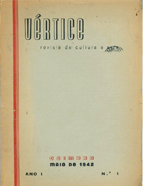

................................
Throughout the pages of Vértice, several articles expressed this pedagogical and civic use of history, in which the “progressive” and “popular” elements of national history were articulated. Despite recurring criticism of the role attributed to “great men” in history, they continued to be presented as examples or personifications of the collective aspirations of the Portuguese people. Luís de Albuquerque, who was very interested in the history of education at the time, dedicated two articles in 1947 to Verney and José Anastácio da Cunha, examples of cultural resistance and progressive spirit in a Portugal dominated by conservatism and retrograde ideas in its educational institutions. By evoking great figures from Portugal’s cultural past, often in commemorative contexts, the aim was to retrospectively legitimise the image of the interventionist and progressive intellectual, dedicated to solving the problems of the Portuguese people. This heroic image of the intellectual is also presented to us, for example, in an article that Armando Bacelar, under the pseudonym Inês Gouveia, dedicated to Leonor da Fonseca Pimentel. Born in Rome but never losing “her interest in the things of her homeland”, she had frequented the court of Naples and was a staunch defender of the need to invest in popular education. Caught up in the troubled political situation of that kingdom at the end of the 18th century, she was sentenced to death by hanging for treason against the Bourbon monarchy. Before she died, “her last salute was to the people” (no. 141, June 1955, 348-52).
Nevertheless, this did not mean that the great cultural figures of the past were given special relevance in the national historical destiny. This role was often assigned to the people as collective heroes. Several articles spread the idea that “in the great crises of nationality, it was always the people who showed the greatest national consciousness” (nos. 22-26, Feb. 1946, 1). The nation and its independence were presented as the work of the Portuguese people, while the nobility and the clergy were often accused of betraying national consciousness and independence in favour of their own class interests, an idea espoused by Fernando Pinto Loureiro, Rui Feijó, Joaquim Namorado, among others. This explains the choice of certain key moments in Portuguese history (1383-85, 1640, the Napoleonic invasions, among others) where the resistance of the people, liberation from foreign domination and the betrayal of the privileged classes were central to the nationalist and popular narrative they sought to spread.
This work is financed by national funds through FCT - Foundation for Science and Technology, I.P, in the scope of the projects UIDB/04311/2020 and UIDP/04311/2020.
